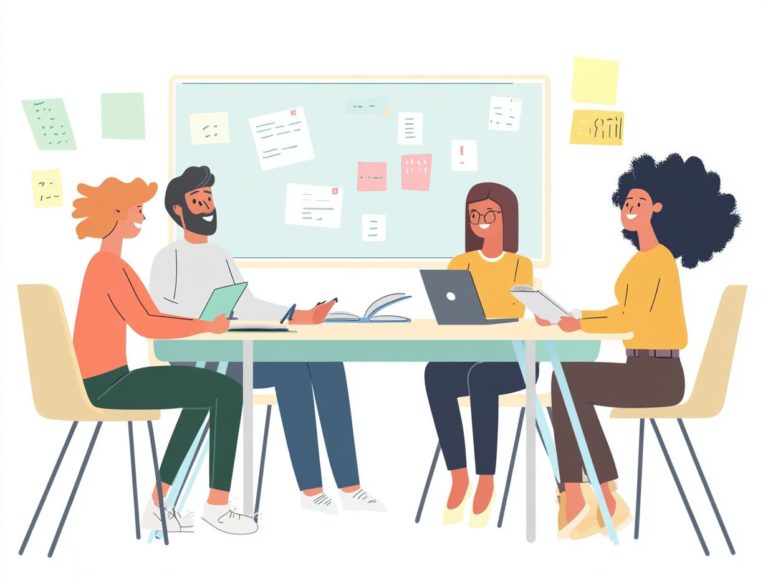5 techniques for enhancing listening comprehension
Mastering listening comprehension is crucial for effective communication. Whether in academic settings, professional environments, or everyday interactions, good listening skills make a difference.
This article explores five powerful techniques: active listening, note-taking, using context clues, asking insightful questions, and regular practice. These can significantly improve your listening skills.
You may face challenges along the way, but tips are available to help you overcome them. Dive in now to discover how to transform your listening abilities!
Contents
- Key Takeaways:
- 1. Active Listening
- 2. Note-Taking
- 3. Using Context Clues
- 4. Asking Questions
- 5. Practicing Regularly
- Why Is Listening Comprehension Important?
- What Are the Common Challenges in Listening Comprehension?
- How Can Active Listening Help Improve Comprehension?
- What Are the Different Types of Note-Taking Techniques?
- How Can Context Clues Aid in Understanding?
- What Types of Questions Should Be Asked for Better Comprehension?
- How Often Should One Practice Listening Comprehension?
- What Are Some Additional Tips for Enhancing Listening Comprehension?
- Frequently Asked Questions
- What are the 5 techniques for enhancing listening comprehension?
- How does active listening help with enhancing listening comprehension?
- What is the role of visuals in enhancing listening comprehension?
- Why is note-taking important for enhancing listening comprehension?
- How does summarizing help with enhancing listening comprehension?
- What role does self-reflection play in enhancing listening comprehension?
Key Takeaways:
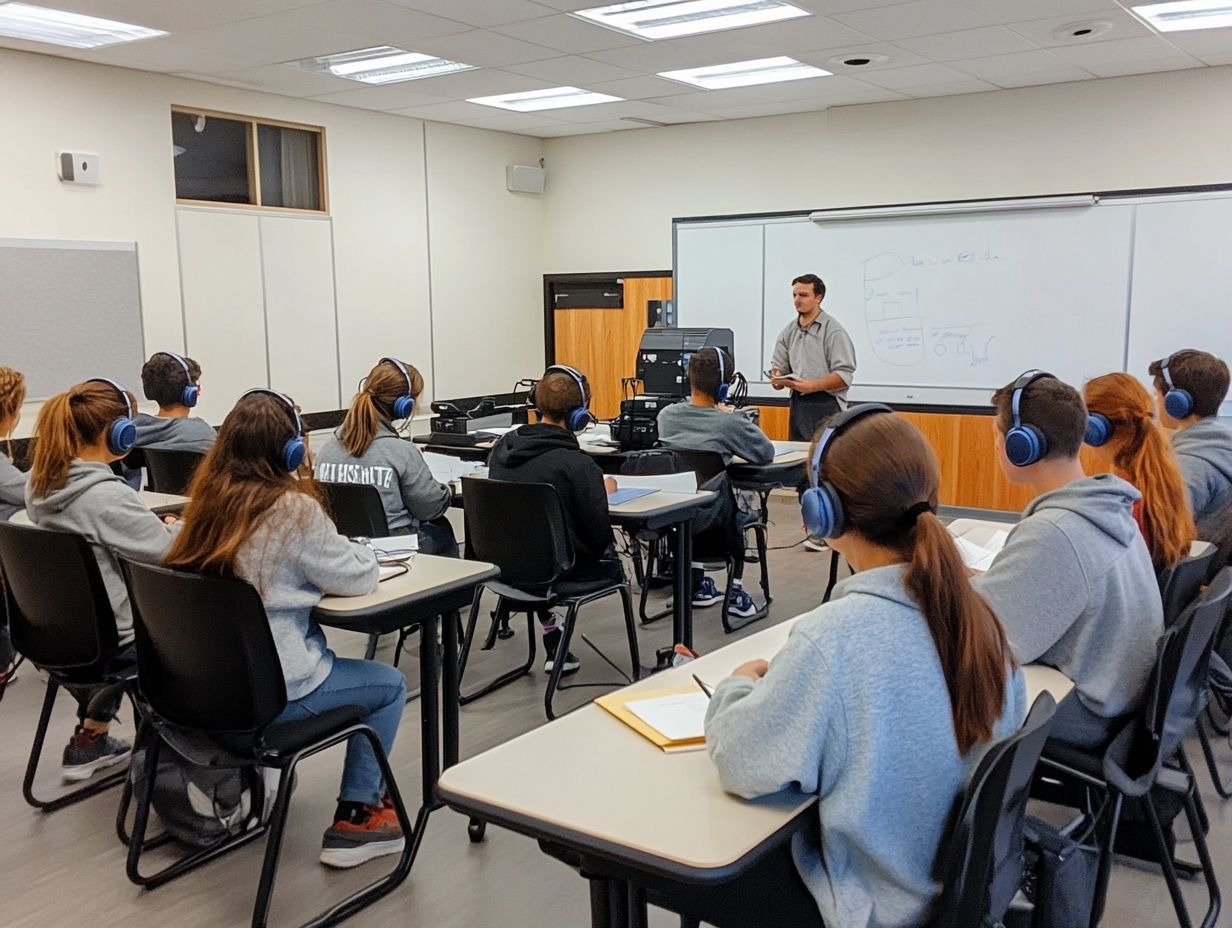
- Active listening is essential for improving comprehension. It involves focusing on and engaging with the speaker.
- Note-taking helps retain information and identify key points during listening activities.
- Using context clues, like body language and tone, provides valuable insights for understanding the message.
1. Active Listening
Active listening is key to enhancing your skills. When you engage fully with the speaker, you absorb their words, emotions, and cues essential for communication.
This approach goes beyond just hearing. It requires effort to understand and respond thoughtfully, enriching classroom dynamics and boosting engagement.
Key elements of active listening include:
- Maintaining eye contact to show the speaker their message matters.
- Offering feedback through nods or verbal affirmations to reinforce connection.
- Encouraging questions to deepen understanding and foster collaboration.
For instance, during a group discussion, a teacher might summarize a student s points and invite others to expand on them. This practice sharpens comprehension and connects classmates’ ideas, creating an inclusive environment.
2. Note-Taking
Effective note-taking is a skill that captures key information during lectures. It enhances your comprehension and retention of material.
Using various note-taking methods tailored to teaching strategies can deepen your understanding of complex subjects.
Techniques like the Cornell method help organize your notes logically for easier review. Mind mapping visually represents relationships between concepts, engaging your creativity and analytical thinking.
Bullet points streamline information, making it easier for auditory learners to process ideas quickly. These methods support your listening and invite deeper engagement with the material.
3. Using Context Clues
Utilizing context clues enhances listening comprehension by helping you infer meanings from surrounding words. This leads to a better understanding of spoken language and aids vocabulary development.
Different types of context clues are important. Definitions provide clear explanations, synonyms offer relatable alternatives, and antonyms present contrasting ideas to aid comprehension.
Incorporate these clues into listening exercises. For example, after hearing a passage, identify the meaning of a challenging word based on synonyms in context or discuss how antonyms clarify concepts.
These activities sharpen your analytical skills and significantly improve your vocabulary retention, preparing you for future academic endeavors.
4. Asking Questions
Asking questions is essential for your participation and comprehension in class. It encourages active engagement with the material.
This interactive approach clears doubts and fosters critical thinking, empowering you to take ownership of your learning.
By using various types of questions open-ended, clarifying, and probing teachers can create a dynamic learning environment.
For example, during a discussion about a complex text, educators might invite you to share your interpretations, seek clarification, or justify your reasoning.
This method keeps you engaged and addresses comprehension issues, allowing you to build knowledge collaboratively.
5. Practicing Regularly
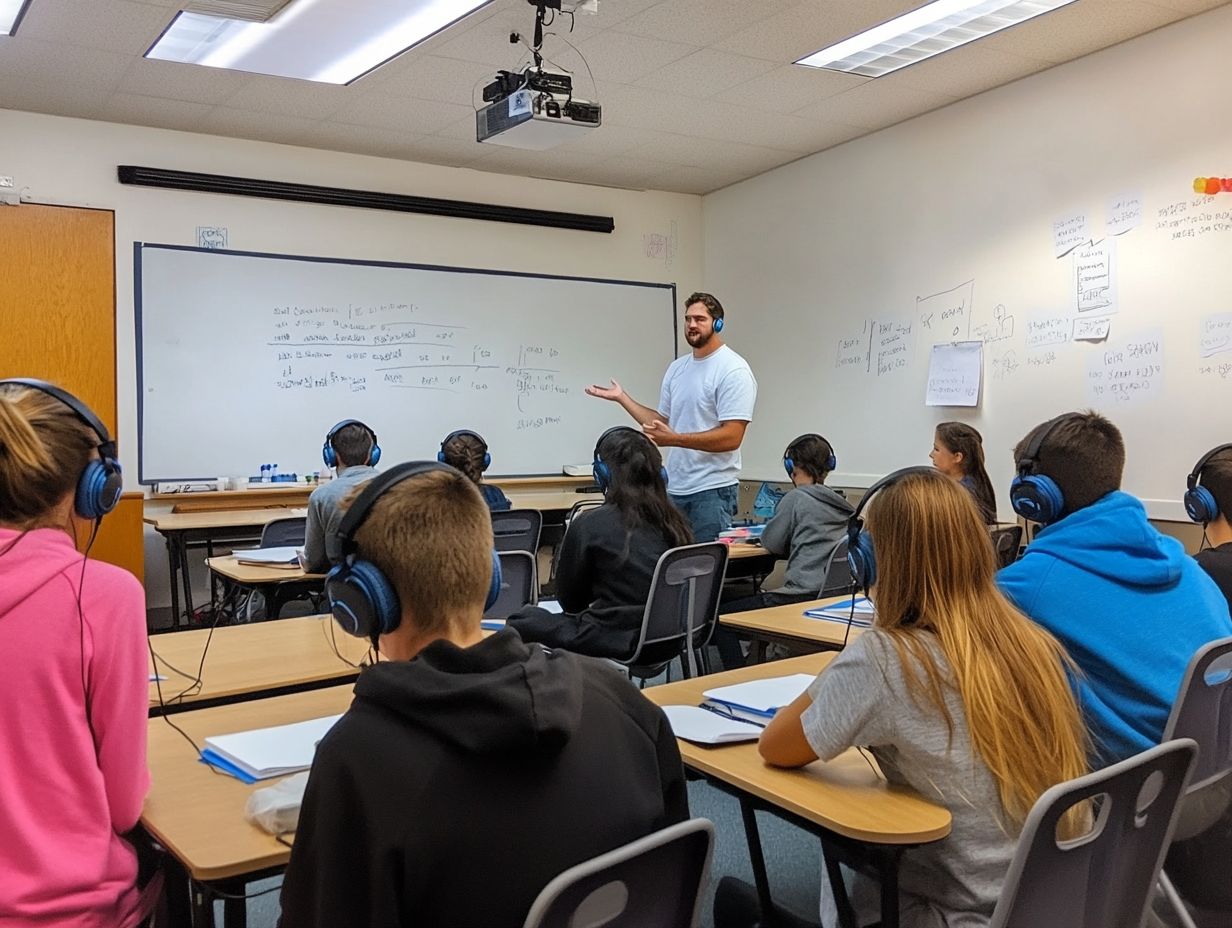
Regularly improving your listening skills is crucial. It helps you effectively process and respond to spoken language in various contexts.
Through targeted listening exercises, you can develop good listening habits and monitor your progress over time.
Podcasts are a fantastic way to immerse yourself in diverse topics. They let you experience different accents and speech patterns.
TED Talks provide thought-provoking content, allowing you to refine your listening skills and critical thinking abilities.
Classroom discussions create an interactive space where you can engage with peers and ask questions to deepen your understanding.
To assess yourself, keep a listening journal to note difficulties and track improvements. Peer reviews or teacher assessments can guide your development and highlight areas for growth.
Why Is Listening Comprehension Important?
Listening comprehension is essential for your academic success and effective communication. Mastering this skill helps you navigate complex information easily.
It enriches your learning experience, allowing you to engage in meaningful dialogues. Active listening helps you absorb and interpret spoken information accurately.
When you listen actively, you contribute to a dynamic and inclusive dialogue, enhancing peer interactions and group learning.
Educators can use interactive discussions, storytelling, and active listening exercises to build these skills. By integrating these strategies into the curriculum, they prepare you to tackle academic challenges confidently.
What Are the Common Challenges in Listening Comprehension?
Common challenges often stem from background noise, unfamiliar vocabulary, and distractions. These can hinder your ability to process spoken information.
Understanding these obstacles allows educators to implement targeted strategies that enhance students’ comprehension skills.
To tackle these issues, create a structured learning environment that minimizes external noise and distractions.
Introduce vocabulary lists before lessons to familiarize students with terms they might encounter. This reduces anxiety related to unknown words.
Incorporate active listening activities like note-taking to encourage engagement and reinforce understanding.
Pairing students for discussions fosters collaboration, allowing them to clarify concepts while boosting their confidence in listening.
By using these 5 techniques for enhancing listening comprehension, you can significantly improve students’ listening comprehension outcomes.
How Can Active Listening Help Improve Comprehension?
Active listening can significantly elevate your comprehension skills by urging you to focus entirely on the speaker. You ll absorb both verbal and non-verbal cues that deepen your understanding and retention of information.
By honing in on what is being said, you can clarify doubts and enhance your grasp of the material during instruction. Incorporating active listening techniques into your learning routine creates a dynamic environment that fosters engagement and critical thinking.
For example, in a history lesson, you might participate in a “listening circle.” Here, you take turns summarizing key events while your peers actively observe and jot down notes.
In science classes, engaging in group discussions allows you to put complex concepts in your own words, reinforcing comprehension through peer interaction.
Faculty can also use video resources. Listening attentively before diving into a reflective dialogue about key points further enhances your ability to process what you hear effectively.
What Are the Different Types of Note-Taking Techniques?
Different note-taking techniques, such as the Outline Method, the Cornell Method, and Mind Mapping, offer diverse ways to engage with what you hear, enhancing your comprehension and retention of information presented in the classroom.
Each technique caters to distinct learning strategies, allowing you to discover methods that align with your preferences. By using these methods in your classroom activities, you can create a more interactive learning environment.
For instance, the Outline Method helps you organize notes hierarchically, reinforcing structure and clarity. The Cornell Method encourages you to summarize key points, promoting active engagement. Mind Mapping visually connects concepts, making complex ideas easier to grasp.
These strategies assist you in retaining information and help you develop critical thinking skills, enabling you to analyze and synthesize what you hear more effectively.
How Can Context Clues Aid in Understanding?
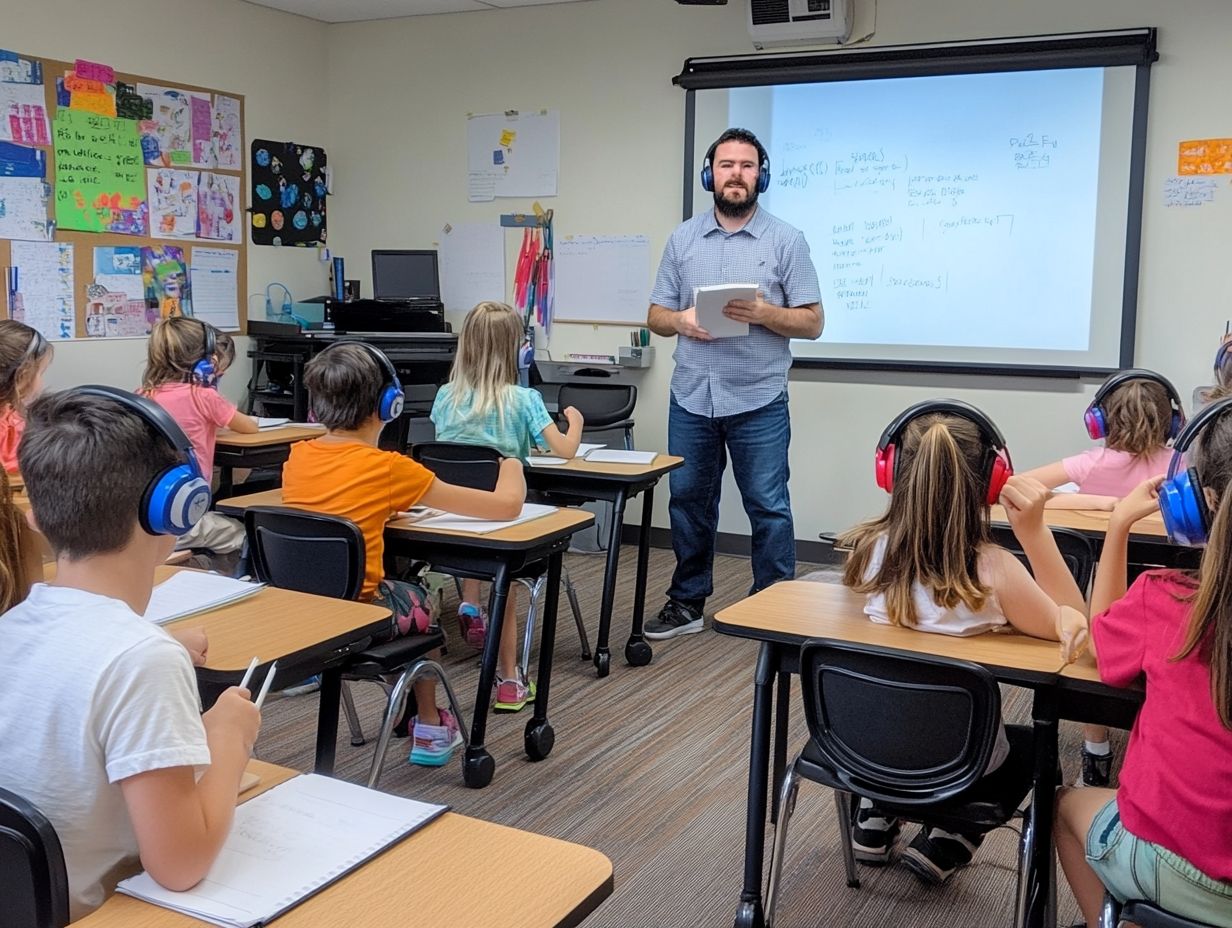
Context clues are invaluable tools that empower you to enhance your listening comprehension. They allow you to deduce meanings from surrounding text or dialogue and make connections with your existing vocabulary.
When used effectively, context clues engage you and facilitate a deeper understanding of the instructional material. For example, when you encounter synonyms or antonyms in discussions, you can identify unfamiliar words based on their meanings.
When teachers provide examples or contrasts, you find it easier to grasp concepts. Using visual aids and real-life scenarios in listening exercises reinforces meaning, enabling you to visualize and relate new vocabulary to your own experiences.
Integrating these approaches into classroom dialogues cultivates critical thinking skills and enhances your overall comprehension, paving the way for a richer academic experience.
What Types of Questions Should Be Asked for Better Comprehension?
Asking the right types of questions is crucial for enhancing your comprehension. It encourages critical thinking and facilitates your active participation in classroom discussions.
By utilizing open-ended, clarifying, and reflective questions, you can gauge your understanding and receive valuable feedback that sharpens your listening skills.
Incorporating specific categories like factual, analytical, and hypothetical questions tailors your learning experience to meet various objectives.
- Factual questions help you assess your knowledge recall.
- Analytical questions challenge you to explore relationships and underlying principles.
- Engaging with hypothetical scenarios ignites your imagination and sharpens your problem-solving skills.
This strategic approach to questioning keeps you engaged and nurtures your critical thinking abilities, promoting a deeper understanding of the material.
When your input is genuinely valued, you re more likely to participate actively. Don’t miss out on these strategies to create a vibrant, interactive classroom atmosphere!
Start practicing these techniques today for better results!
How Often Should One Practice Listening Comprehension?
Regular practice of listening comprehension is essential; it not only reinforces your learning strategies but also allows you to measure your progress over time. To further improve, consider applying techniques for effective note-taking in language, which ultimately enhances your effective listening abilities.
Engaging frequently with diverse auditory materials ensures you stay adept at processing and responding to spoken language. To achieve proficiency, it’s advisable to practice listening comprehension at least three to four times a week.
Engaging in activities like listening to podcasts, watching movies with subtitles, or participating in conversational exchanges can significantly strengthen your skills. These varied approaches expose you to different accents, vocabularies, and contexts, promoting a deeper understanding.
Incorporating group discussions or listening quizzes can be enjoyable ways to track your improvement. Consistent practice keeps your motivation high and fosters greater confidence in your listening capabilities over time.
What Are Some Additional Tips for Enhancing Listening Comprehension?
Enhancing your listening comprehension is an exciting adventure waiting for you, achieved through various effective strategies. To help alleviate any nerves, consider exploring 5 techniques to overcome language anxiety. Engaging with diverse auditory materials and cultivating effective listening habits can elevate your skills significantly.
Interactive classroom activities can also sharpen your auditory capabilities while enriching your comprehension experience. Introduce activities like storytelling sessions where you listen to a narrative and then discuss the plot and characters, naturally encouraging critical thinking. Additionally, implementing techniques to build confidence in speaking can further enhance participation and engagement.
Embracing technology, such as podcasts and audiobooks, provides a wealth of engaging content. Following listening exercises with group discussions or utilizing graphic organizers to visualize information can further solidify your understanding.
Incorporating enjoyable games like “listening charades” adds fun and interaction to the process. Regular feedback is crucial; it helps identify areas for improvement while reinforcing your existing listening strengths.
Frequently Asked Questions
What are the 5 techniques for enhancing listening comprehension?
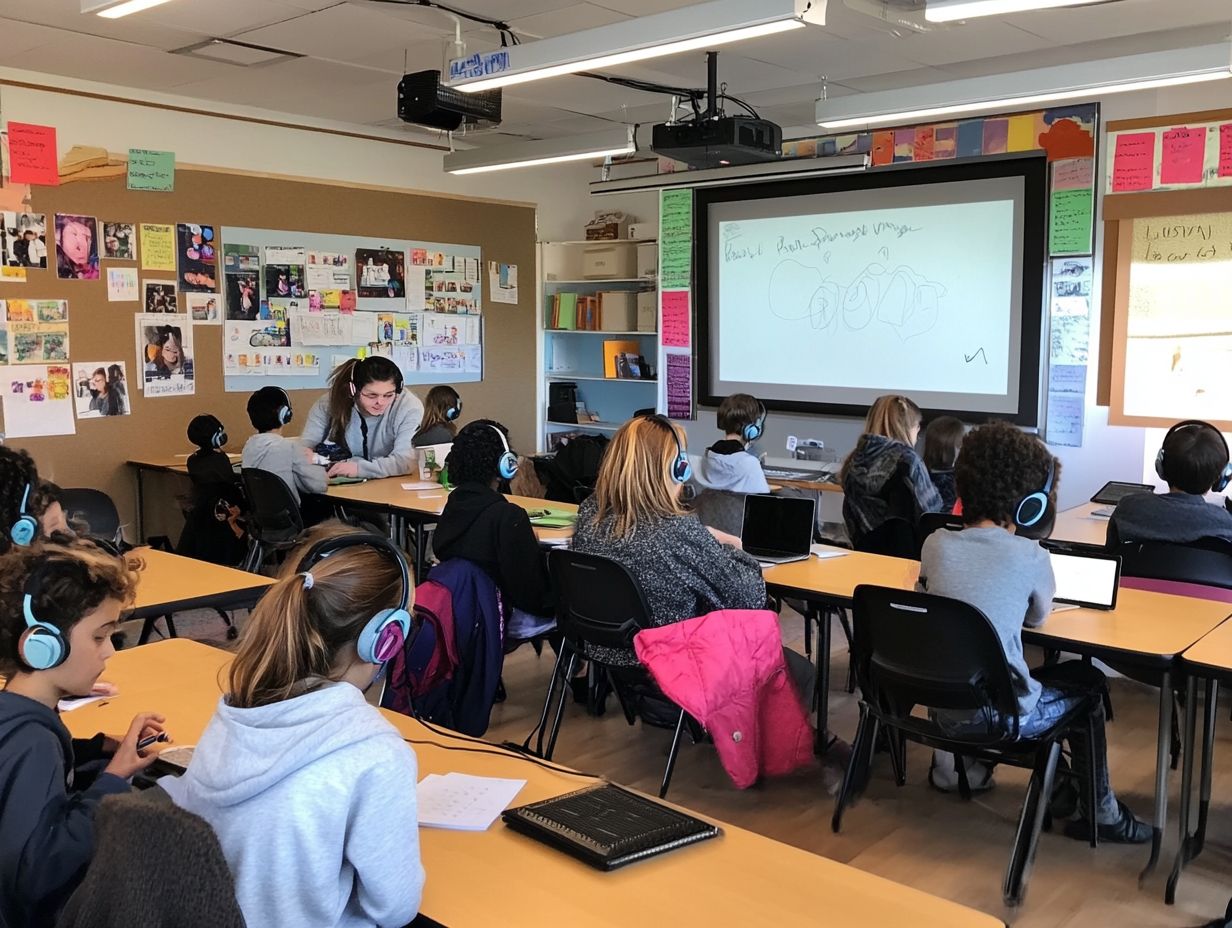
- Active listening: Fully focusing on what someone is saying.
- Using visuals: Incorporating images or diagrams to support spoken information.
- Note-taking: Summarizing and organizing information effectively.
- Summarizing: Condensing main ideas and key points into concise summaries.
- Self-reflection: Analyzing your own listening skills to identify areas for improvement.
How does active listening help with enhancing listening comprehension?
Active listening involves giving full attention to the speaker and engaging in the conversation. This improves understanding and retention of information, thus enhancing listening comprehension.
What is the role of visuals in enhancing listening comprehension?
Visual aids, such as images, diagrams, and videos, enhance listening comprehension by providing visual cues that support spoken information. They also help keep the listener engaged and focused on the topic.
Why is note-taking important for enhancing listening comprehension?
Note-taking involves summarizing and organizing information in a meaningful way. This helps improve understanding and retention of key points, making it an effective technique for enhancing listening comprehension.
How does summarizing help with enhancing listening comprehension?
Summarizing condenses the main ideas and key points of a conversation or lecture into a brief summary. This helps listeners better understand and remember the information, thus enhancing listening comprehension.
What role does self-reflection play in enhancing listening comprehension?
Self-reflection involves analyzing your listening skills and identifying areas for improvement. This can help develop more effective listening strategies and enhance overall listening comprehension.
If you’re ready to enhance your listening comprehension, start practicing these 7 techniques for overcoming language barriers today and share your experiences with others!

